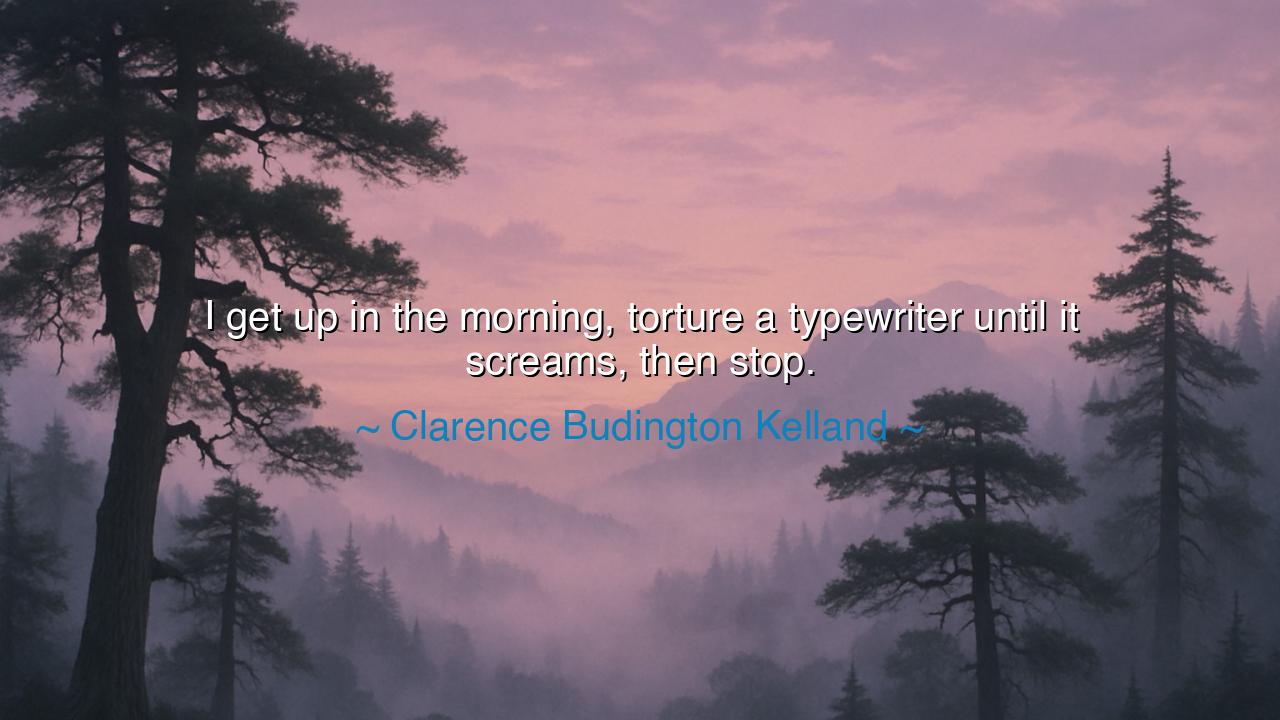
I get up in the morning, torture a typewriter until it screams






When Clarence Budington Kelland declared, “I get up in the morning, torture a typewriter until it screams, then stop,” he gave voice to the eternal struggle between the creator and the act of creation. These words, wrapped in humor, are also charged with truth: that to bring forth words, stories, and ideas is no gentle pastime, but a battle. The typewriter, an instrument of order, is made to yield under the relentless force of the writer’s will. Each keystroke is a blow, each line a victory, until the machine itself seems to cry out, overcome by the intensity of the task.
This quote unveils the essence of the writer’s labor. To outsiders, writing may appear serene, a poet musing quietly, or a novelist sipping coffee while words flow like water. But those who have labored with pen or machine know that it is a discipline of fire and fury. The writer tortures the page, wrestles with stubborn sentences, and bleeds thoughts into form. Creation is resistance, and the act of writing is not play but combat—against laziness, against confusion, against silence itself. Kelland, with a sharp tongue, captures this reality with the image of a typewriter screaming beneath his hands.
History abounds with those who fought this same battle. Consider Victor Hugo, who locked away his clothes so that he might not leave his study, forcing himself to remain at his desk until he completed his masterpiece Les Misérables. He too “tortured” the page, wringing out words until they yielded to his vision. Or think of Hemingway, who described writing as sitting at a typewriter and bleeding. Each of these figures, like Kelland, knew that the birth of words required pain, persistence, and a relentless hand pressing against the resistance of thought.
Yet within this battle lies glory. For though the typewriter screams, the world listens. The writer’s toil in solitude creates songs, stories, and wisdom that echo far beyond his chamber. The scream of the machine becomes the laughter, the tears, and the revelations of countless readers. Thus, the struggle is not meaningless; it is the crucible through which timeless truths are forged. What seems like torment to the writer becomes illumination to the world.
The lesson here is not for writers alone, but for all who labor at the edge of creation. Whatever your craft—be it painting, building, teaching, or leading—you too must “torture” the instrument of your trade. You must strike against resistance until your work yields its fruit. Do not expect ease, for greatness is born in tension. The bowstring must be pulled taut before the arrow can fly; the stone must endure the chisel before it becomes a statue. In this way, every creator echoes Kelland’s morning ritual.
So what must you do? Rise with intention. Face your own “typewriter”—whatever tool your craft demands—and work upon it with discipline. Accept that it will resist you, that it will not yield easily. Press on until the work “screams,” until it reveals its truth, and then stop—not in exhaustion, but in fulfillment. Return again the next day, ready for battle once more. For creation is not one victory but a thousand small ones, won day by day in the quiet hours of labor.
Thus, Kelland’s playful words conceal a timeless teaching: that the path of the creator is not comfort but struggle, not ease but persistence. Yet in this struggle lies the joy of conquest, the triumph of seeing something born that did not exist before. The screaming typewriter is the sound of victory. So let us embrace the labor, the discipline, and the fire, knowing that through our struggle, we bring forth the treasures that enrich the lives of generations to come.






AAdministratorAdministrator
Welcome, honored guests. Please leave a comment, we will respond soon